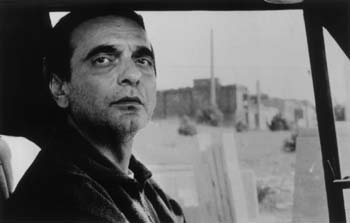Iranian Ironist
Abbas Kiarostami's 'Taste of Cherry' is one step ahead of the critical game
By Michelle Goldberg
THE BEAUTIFUL Iranian film Taste of Cherry, which won the Palme d'Or at Cannes, so fully encapsulates what American audiences expect of foreign films that it seems almost quaint until its ironic last sequence. The story of Mr. Badii (Homayoun Ershadi), a suicidal man searching for someone who will bury him if he succeeds in killing himself and save him if he fails, is sweetly despairing, wry, philosophical, roughly lyrical--all the usual art-house adjectives. But in the last minute, director Abbas Kiarostami pulls a postmodern coup and proves that he was one step ahead of the critical game all along.
I won't give it away except to say that with the final shot, Taste of Cherry morphs from a bittersweet meditation into a slightly inscrutable meta-art film. The odd ending may have been included simply to circumvent Iranian censors, but it still concludes the film on a surprisingly detached note. The audience, in suspense over the fate of the miserable protagonist, is suddenly told the whole thing was just a kind of intellectual game.
It is a good thing that Ershadi's worn, friendly, frowning face with St. Bernard eyes and thoughtful downturned mouth is so expressive, because his profile fills the screen for almost the entire first half of the movie as Badii cruises around Tehran looking for someone to complete an unspecified job.
At first, when he promises a teenaged army draftee that "in 10 minutes, you can earn six months' pay," it seems that he's looking for sex. But when Badii takes him to the grave he's dug himself and gives him his instructions, the young soldier panics and flees. Next Badii tries to enlist an Afghani seminary student before finally finding a hearty old taxidermist willing to help him.
In the course of a drive through Tehran's hilly outskirts, though, the taxidermist tells Badii a story about his own suicide attempt decades before. It seems that the taxidermist, then newly married, poor and desperate, decided to hang himself from a mulberry tree. Unable to get the rope to catch, he climbed the tree, tasted a succulent berry and glimpsed hope and happiness.
"I had left to kill myself, and I came back with mulberries! A mulberry saved my life!" he says, then launches into a sardonically funny speech about the small pleasures that make life worthwhile. Echoing the film's title, he exhorts Badii, "You want to give up the taste of cherries?"
He nearly convinces him, but that evening, as planned, Badii takes his sleeping pills, climbs into his grave and stares at the stormy night sky and full moon. As he waits for death or redemption, the screen goes black for 10 seconds and the only sound is falling rain.
What follows could mean many things, and, strangely, two upcoming films that Kiarostami couldn't conceivably have been aware of when he was making Taste of Cherry now color its meaning. Those two films, the Ukrainian A Friend of the Deceased and Warren Beatty's Bulworth (along with Krzysztof Kieslowski's White), share a hint of Taste of Cherry's plot: a desperate, beaten man hiring someone to assist his suicide.
This strangely synchronous timing suggests that when Kiarostami pulls back his camera, he's surveying more than the Tehran skyline. With his unexpected ending, Kiarostami seems to be casting a lovingly mocking gaze on the moody existentialism of Western cinema.
[ San Jose | Metroactive Central | Archives ]
![]()

Looking for the Last Exit: Suicidal Mr. Badii (Homayoun Ershadi) wants to park his body and his spirit for good in 'Taste of Cherry.'
Taste of Cherry (Unrated; 95 min.), directed and written by Abbas Kiarostami, photographed by Homayun Payvar and starring Homayoun Ershadi.
From the May 14-20, 1998 issue of Metro.
![[Metroactive Movies]](/movies/gifs/movies468.gif)